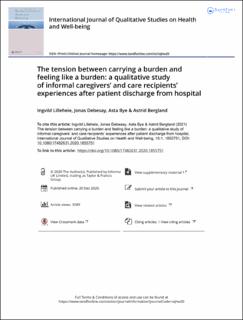| dc.contributor.author | Lilleheie, Ingvild | |
| dc.contributor.author | Debesay, Jonas | |
| dc.contributor.author | Bye, Asta | |
| dc.contributor.author | Bergland, Astrid | |
| dc.date.accessioned | 2021-12-08T09:04:04Z | |
| dc.date.available | 2021-12-08T09:04:04Z | |
| dc.date.created | 2020-12-28T12:08:51Z | |
| dc.date.issued | 2020-12-20 | |
| dc.identifier.citation | International Journal of Qualitative Studies on Health and Well-being. 2021, 16:1855751 (1), 1-14. | en_US |
| dc.identifier.issn | 1748-2623 | |
| dc.identifier.issn | 1748-2631 | |
| dc.identifier.uri | https://hdl.handle.net/11250/2833283 | |
| dc.description.abstract | Purpose: The number of people aged 80 and above is projected to triple over the next 30 years. Expanding public expenditure on long-term care services has made policies encouraged informal caregiving. Burden of care describes challenges connected to informal caregiving. Dependent patients report feelings of being a burden. Few studies have focused on both the experience of caregiver burden and recipients’ feelings of burden. This study explore the experiences of old patients and informal caregivers in the first 30 days after the patient’s discharge. Method: A phenomenological approach was used to explore the subjective experiences of the participants. Semi-structured individual interviews were analysed thematically. Results: The reults reflect imbalance regarding care needs relative to time, social roles, physical and emotional states, and formal care resources. Four themes emerged from the interviews: 1) Bridging the gap, 2) Family is family, 3) Never enough, and 4) Stress and distress. Conclusions: The participants face strains within their roles. The care situation has potential to be burdensome. To secure healthcare quality for old patients, the informal carer’s role needs to be recognized. Informal care based on altruism and reciprocity seems to be positive, whereas informal care based on family norms might have a negative impact. | en_US |
| dc.description.sponsorship | This work was supported by the Research Council of Norway [project. nr. 256644/H10]. | en_US |
| dc.language.iso | eng | en_US |
| dc.publisher | Routledge | en_US |
| dc.relation.ispartofseries | International Journal of Qualitative Studies on Health and Well-being;Volume 16, 2021 - Issue 1 | |
| dc.rights | Navngivelse-Ikkekommersiell 4.0 Internasjonal | * |
| dc.rights.uri | http://creativecommons.org/licenses/by-nc/4.0/deed.no | * |
| dc.subject | Healthcare | en_US |
| dc.subject | Elderly patients | en_US |
| dc.subject | Informal care | en_US |
| dc.subject | Care quality | en_US |
| dc.subject | Care burdens | en_US |
| dc.subject | Reciprocity | en_US |
| dc.subject | Equity | en_US |
| dc.title | The tension between carrying a burden and feeling like a burden: a qualitative study of informal caregivers’ and care recipients’ experiences after patient discharge from hospital | en_US |
| dc.type | Peer reviewed | en_US |
| dc.type | Journal article | en_US |
| dc.description.version | publishedVersion | en_US |
| dc.rights.holder | © 2020 The Author(s). | en_US |
| dc.source.articlenumber | 1855751 | en_US |
| cristin.ispublished | true | |
| cristin.fulltext | original | |
| cristin.qualitycode | 1 | |
| dc.identifier.doi | https://doi.org/10.1080/17482631.2020.1855751 | |
| dc.identifier.cristin | 1863480 | |
| dc.source.journal | International Journal of Qualitative Studies on Health and Well-being | en_US |
| dc.source.volume | 16:1855751 | en_US |
| dc.source.issue | 1 | en_US |
| dc.source.pagenumber | 1-14 | en_US |
| dc.relation.project | Norges forskningsråd: 256644/H10 | en_US |

